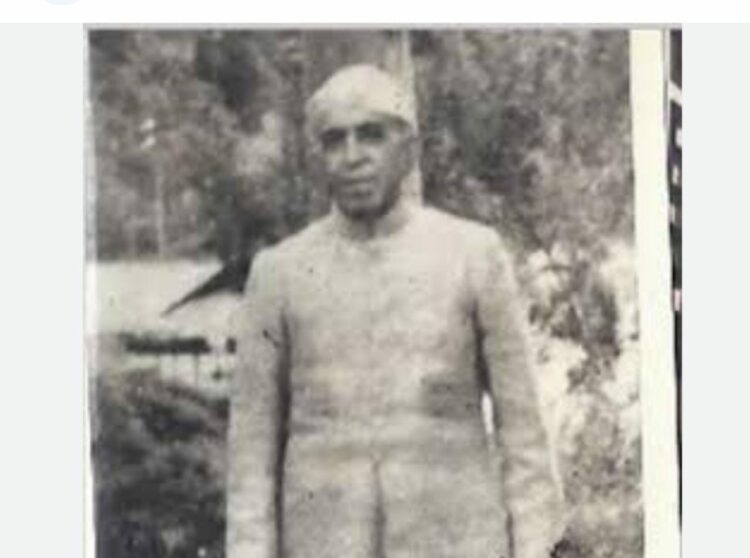Guwahati : Kuladhar Chaliha, a political, cultural and literary stalwart from Assam in the early 20th century, proposed to the Union Government lawmakers in 1949 that Sanskrit be recognized as the country’s national language.
Netizen Zula Sarma, in a post accommodated by a group from Assam on Facebook, makes this claim about the first president of the Assam Pradesh Congress Committee and goes on to highlight the usefulness of this ancient language in the modern world controlled by science and technology, citing views and opinions of renowned scholars and Indologists.
Zula Sarma is candid about the fact that Sanskrit is the origin of the modern Indian languages, including those belonging to the southern part of the country.
While the number of languages spoken worldwide today is estimated at 6,900, Sanskrit remains the oldest language on the planet which is acknowledged as ‘perfect from a linguistic point of view’. Not only the languages spoken in India today but languages developed overseas were also being inspired by Sanskrit, says Zhula Sarma in her online post.
The New Delhi facebook member’s Assamese post on the social site fittingly recalls the Forbes report in 1987, which said that Sanskrit is the most compatible language to be applied to a computer. However, Sanskrit is yet to find its place in computer hardware or software programmes.
Zula Sarma adds – German scholar and an India-specialist Prof Max Mueller opined that “Sanskrit is the greatest language in the world, the most wonderful and the most perfect, while Prof Bopp commented, “Sanskrit was at one time the only language of the world.”
Scholar M. Dubo believes that “Sanskrit is the origin of the modern languages of Europe.”
Sanskrit was the predominantly spoken language in India till 3,000 years ago, and of course, Sanskrit was the language of ancient Hindu scriptures. In 2011, the census report revealed that 28,821 people in India speak Sanskrit. The number of Sanskrit telling people in 2001 was even smaller -14,135. Arabi-speaking people in the country in 2001 were 51,000, outnumbering Sanskrit speakers. Presumably, Arab speakers swelled their number in 2011, though the exact figures are unavailable, comments Zula Sarma.
The usage and application of Sanskrit, dubbed a divine language, in the modern era is spreading to newer spheres worldwide. Before adopting a constitution in 1950, Independent India held a series of consultations to frame new rules. At such a meeting of the consultative committee held from September 12 to 14, 1949, the national language issue figured. Gopalswamy Iyenger submitted the initial proposal in the forum. Iyenger needed to be more enthusiastic about Sanskrit becoming the national language. However, he conceded that Sanskrit was a clear language for regional Indian languages like Assamese, Bengali, Odia and others.
It is worth recalling that a Muslim participant in the meeting, Nazruddin Ahmed, in his speech had lauded Sanskrit as the language most developed, and he cited the opinions offered on the vocabulary as well as Panini grammar by internationally renowned scholars, such as Max Mueller, Prof Bopp W C Taylor and SirWilliam Jones.
Consequently, on September 13, a member of the consultative committee R B Dhulekar expressed his support for Sanskrit as the national language, but in addition to Hindi. In this context, he commented that Sanskrit had been a world language, and this divine language could afford to let Hindi become the national language because that would pave the way for Sanskrit to reign as the world language.
Lakhikanta Moitra from West Bengal was the first Constitutional Consultative Committee member to propose national language status for Sanskrit, followed by Lakhsmi Narayan Sahu from Odisa.
Pioneer BJP and previously Jana Sangh leader Shyama Prasad Mukherjee said in his speech that Sanskrit was being mocked in those days, despite it being a treasure of knowledge, wisdom and India’s mother tongue. Mukherjee advocated a worthy space for Sanskrit in the country’s educational system.
Following Lakhikanta Moitra’s deliberations in the meeting, the first president of the Assam Pradesh Congress Committee, Kuladhar Chaliha, a member of the Constitution Consultative Committee, submitted a proposal for recognizing Sanskrit as India’s national language.
The following day, September 14, Hindi and not Sanskrit, was accorded the status of Rashtra Bhasa. So, Hindi and English are the official languages of India today.














Comments